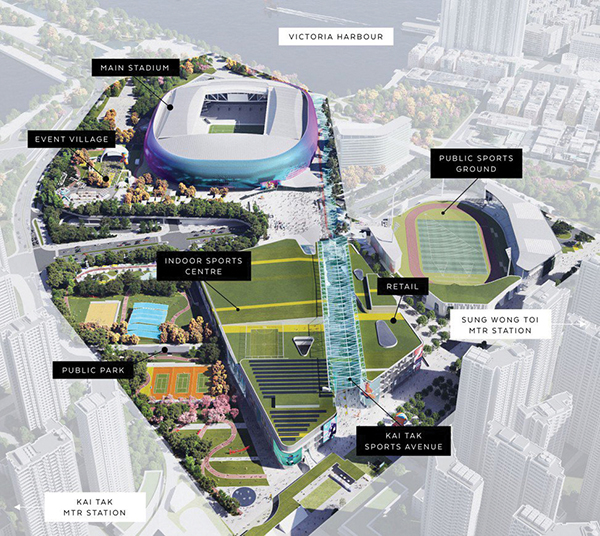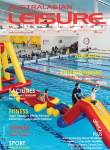Hong Kong’s Park for All

Populous sees the plan for Hong Kong’s Kai Tak Sports Park as setting a new multipurpose sport precinct benchmark
International sports architects Populous say that Hong Kong’s multipurpose sports precinct, the Kai Tak Sports Park, will set a global benchmark for multipurpose sport precincts when it opens in 2023.
With construction now underway on the prized real estate on the old Kai Tak airport runway, overlooking Victoria Harbour and Hong Kong Island, Populous, a member of the Kai Tak Sports Park Limited (KTSPL) consortium, is confident it will deliver a “park for all” while setting a new world benchmark.
Paul Henry, Populous’ senior principal/managing director for Asia-Pacific, advises “there is nothing like this anywhere in the world, it’s unique.
“This is a special moment in time to be able to use this land. It’s an extraordinary site in one of the best positions you could ever hope for in any city in the world.
“We have created a new benchmark in the world for sports, entertainment and community facilities that are connected in an urban oasis.”

With Populous having recently completed Tottenham Hotspur’s new stadium in London, Henry advised “we have been very lucky to design 3,000 projects around the world, we have never done one like this.
“The London Olympics is the benchmark. The park forced us to spread facilities out because of the crowds. Here, we had the chance to compress, to bring (everything) together.
“There is nothing like this in the range of facilities, from leisure, sport, retail, wellness, community. What excites us is that we have gathered all the components and the best of Hong Kong into one design.
“We have created something different, rather than a single use venue of which there are so many in the world.”

Adding that the goal was seven-day-a-week usage and engagement with communities and neighbourhoods, Henry went on to say “we believe this will be one of the most used facilities in the world in how it integrates with the surrounding area as well as the range of facilities.”
The new HK$30 billion sports precinct will be built around a sports avenue, an indoor and outdoor pedestrian walkway that starts at Station Square - the connection to the park linking new MTR stops Kai Tak Station and Sung Wong Toi Station - and takes people all the way to the harbourfront. It also connects to other parts of the park such as Dining Cove.
“There is fantastic history on this site,” Henry explained, referring to an 1800s connection point between Hong Kong Island and the mainland and more recently Kai Tak airport which served as an entry and exit point to Hong Kong for so many years.
He advised “the idea of the sports avenue is to pick up on those connections and take it one further where athletes can train here and then go to the world from this location.”
The 50,000-seat main stadium will feature an infinity edge design above the south stand, with a vast activity platform that looks out over Victoria Harbour.

The main stadium will feature the latest technology in its retractable roof and a flexible pitch surface that can be switched between natural turf to other surfaces to host a range of international, regional and local events in any weather.
The park also includes a 10,000-seat indoor sports centre, a 5,000-seat public sports ground, and more than eight hectares of open spaces.
The Kai Tak Development project was initiated in 2007 as one of Hong Kong’s 10 major infrastructure projects.
Hong Kong’s main sports facilities currently include the Hong Kong Stadium, Hong Kong Coliseum and Queen Elizabeth Stadium - built in the 1980s and 1990s.
Those venues cannot meet the requirements of large sports events and Kai Tak Sports Park will attract a bigger roster of regional and international sports events to the city, a development in line with the city’s drive to strengthen the role of Hong Kong as a host to Asian sports.
There have been concerns that sports events may come second to entertainment or other more profitable events, such as music concerts.
However, Timothy Fok Tsun-ting, President of the Hong Kong Olympic Committee, has advised that strict rules imposed by the Hong Kong Government should help improve the situation.
Fok advised that “now we have the policy, the park operator and individual sports associations should sit down and discuss how to bring more events to the Sports Park.
“It’s not going to be easy as we are competing against many cities from across the border in the mainland, while South East Asian nations are also keen to stage sports events. But at least we will have the excellent facility in the next couple of years and we can compete with other cities.”
The Hong Kong Government will also set up a high-level advisory committee one year before the commencement of the Sports Park operations to provide recommendations on strategies, business plans and management of the facilities, as well as to advise on the performance of KTSPL.
Members of the committee will be appointed by the Secretary for Home Affairs and will comprise representatives from the sports sector, Legislative Council and district councils, and other professionals experienced in management and marketing.
A KTSPL spokesperson said they are confident of meeting the target, stating “our team comprises some of the world’s leading sports programming experts who have privileged access to major sports rights holders, including leagues, federations, clubs, and associations.
“We are confident we will be able to curate a comprehensive sports calendar that contains a good mix of international and regional events, as well as grassroots and community content.
“We have already started discussions with event organisers and sports rights holders who are exploring opportunities for their events to be hosted at Kai Tak Sports Park.”






